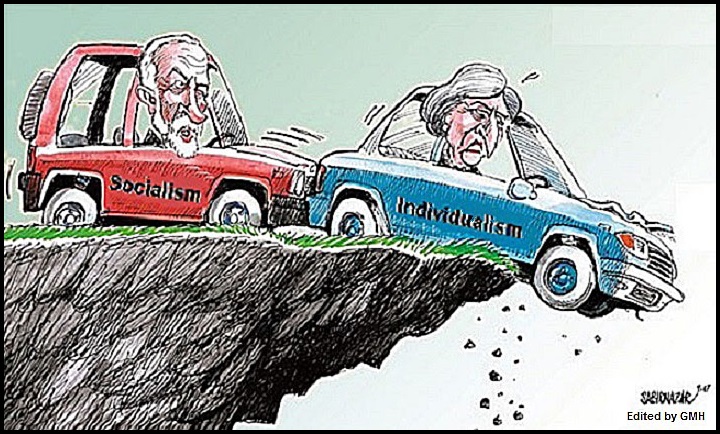
Geoffrey M. Hodgson
Socialism and individualism, as defined here, are both outdated creeds, unsuited to the complexities of modern socio-economic organisation and technology. Yet these ideologies have captured the UK Labour and Conservative parties respectively, and are driving them both over the Brexit cliff.
In 1827 the word “socialist” first appeared in English, in a magazine published by followers of Robert Owen. The word “individualism” was coined at about the same time. “Socialism” and “individualism” were then widely adopted as antonyms of each other.

Robert Owen
Owen defined socialism as “the abolition of private property”. The same definition was adopted by Karl Marx. Criticism of private ownership has marked the UK Labour Party from Kier Hardie to Jeremy Corbyn.
For example, Clement Attlee wrote in 1937 of the “evils” of capitalism: their “cause is the private ownership of the means of life; the remedy is public ownership.” Attlee approvingly quoted the words of Bertrand Russell:
“Socialism means the common ownership of land and capital … It involves the abolition of all unearned wealth and of all private control over the means of livelihood of the workers.”
In an interview in 2000, Corbyn’s mentor Tony Benn favourably quoted Attlee: “If you look around the world, what are the problems? They’re all caused by the private ownership of the means of production, distribution, and exchange.” Corbyn has followed this, as A-B-C.
Individualism has several different meanings. I take it here to be a libertarian political doctrine, promoting an economy dominated by individual entrepreneurs and their private property. Individuals trade with each other on competitive markets, with a small state intervening minimally in economic affairs.

Milton Friedman
Although this ideology goes back centuries, versions of it are associated more recently with Milton Friedman, Friedrich Hayek, Keith Joseph and Margaret Thatcher, plus many living Tories such as Daniel Hannan and David Davis.
Classical socialists, including Jeremy Corby, John McDonnell and Diane Abbott, now control the Labour Party. The Conservative Party is dominated by a nationalist-individualist ideologues that support Brexit.
Despite their obvious differences, classical socialism and individualism have much in common, and not simply in terms of some shared basic assumptions. I explore why below.
Individualism and its limitations
Individualism assumes that the individual is generally the best judge of his or her own interests. For this to be meaningful, the individual must have sufficient information about, and understanding of, the choices involved and their implications. Individualists are aware that such information and understanding are sometimes in short supply, but insist that the ultimate responsibility must lie with the individual rather than with the “nanny state”.

Another problem for individualism is externalities, where our consumption may adversely affect others. For example, driving cars leads to congestion, noise and pollution. Individualists argue that those affect could sue those responsible for the adverse effects, but such externalities are now so commonplace that it is difficult to see how individual litigation could feasibly deal with such problems.
Individualist policies face additional difficulties as capitalism becomes ever-more complex, knowledge-intensive and globally inter-connected. They become increasingly anachronistic. When commodities become more complex and heterogeneous, market prices cannot be relied upon alone to signal information about demand and supply.
Highly complex technologies have invaded our lives. When people buy smartphones, do they know enough about them to make an informed choice between, say, a Samsung Galaxy S8, a OnePlus 5 or a Google Pixel? In making such choices, over technologies that we poorly understand, we depend on the recommendations of others. We have to rely to a degree on trust, rather than purely on the specifications of a contract.
 Complex interconnections lead to unforeseen outcomes. Much of our consumption leads to emissions that can adversely affect the climate. But few people are qualified to understand climate science. Alarmingly many people defy the consensus among scientific experts and deny that such emissions will lead to deleterious climate change. Individuals do not always choose that which is best for themselves, or for humankind.
Complex interconnections lead to unforeseen outcomes. Much of our consumption leads to emissions that can adversely affect the climate. But few people are qualified to understand climate science. Alarmingly many people defy the consensus among scientific experts and deny that such emissions will lead to deleterious climate change. Individuals do not always choose that which is best for themselves, or for humankind.
In sum, old fashioned individualism assumes an economy with relatively simple physical commodities, that can be readily controlled or owned, and whose effects are well understood.
How the complex information economy challenges individualism
In modern capitalism, information has become a major commodity. We are no longer in a world where trade was dominated by bulk commodities like steel and coal. Information is a peculiar commodity. You do not know what you are buying until you have bought it. But the information is known to the seller after it passes to the buyer. It can often be readily copied at very low cost. Ownership of information is often problematic.
 Of course, incentives must be in place (such as patents) for the private development of knowledge, but a market economy would grind to a halt if every piece of information was privately owned and had a price. The benefits of private and contractual provision of some information may be much less than the overall opportunity costs of charging a price for its use. A healthy market system itself depends on the incompleteness of markets for information; some crucial data must be unowned and available freely.
Of course, incentives must be in place (such as patents) for the private development of knowledge, but a market economy would grind to a halt if every piece of information was privately owned and had a price. The benefits of private and contractual provision of some information may be much less than the overall opportunity costs of charging a price for its use. A healthy market system itself depends on the incompleteness of markets for information; some crucial data must be unowned and available freely.
In the early 1990s, CERN (the European Organization for Nuclear Research) developed key elements of the Internet infrastructure. They were released to the public for free, to ensure that the information technology would become widespread. Similarly, many software programs and even operating systems are available free of charge. The Internet has vastly stimulated markets, but not all its components or enablers were marketed.
If it were suited to the world of 200 years ago, classic individualism is ill-suited to the modern complex world. Yet this anachronistic individualism has made headway since the 1970s, particularly in the UK Conservative Party and among Tea Party Republicans in the USA.
Socialism and its limitations
One reason why classical individualism has made progress is the failure of classical socialism, including in the USSR, China and elsewhere. While moderate social democracy has made advances by reforming capitalism and developing welfare states (particularly in northern Europe) the Tweedledum and Tweedledee politics of socialism versus individualism have prevailed.
 Cooperation can work in small groups, based on close, inter-personal interactions. Humans have co-operated in families and tribal units for many thousands of years. Hence classical socialism might work on a small scale. In small-scale communities, participants may monitor each other, to ensure that necessary tasks are carried out and that the interests of the community are served.
Cooperation can work in small groups, based on close, inter-personal interactions. Humans have co-operated in families and tribal units for many thousands of years. Hence classical socialism might work on a small scale. In small-scale communities, participants may monitor each other, to ensure that necessary tasks are carried out and that the interests of the community are served.
But big problems emerge when we move from tribal to large-scale societies, where face-to-face, trust-based mechanisms to sustain cooperation are relatively less effective. They have to be supplement by other incentives and constraints.
Large-scale socialism assumes that comprehensive planning agencies can bring most resources under unified control and that the planners can gather together all the relevant knowledge concerning the nature, use and effects of those resources. Such a mobilisation of resources is only possible with simpler goods that are relatively homogeneous and relatively few in varieties.
Large-scale socialism thus assumes an economy with relatively simple physical commodities, that can be readily counted, mobilized, controlled or owned, and whose effects are well understood.
Large-scale socialism creates incentive problems. Socialist experiments typically involved collectivisation. But when thousands of people are brought together, and rewards are shared, then there is less incentive to make the extra effort, because the rewards from that additional work would be hugely diluted.
Socialism and the challenges of complexity and scale
Central planners face the problems of dispersed knowledge and uncertainty in all large-scale economies. These problems are progressively exacerbated as technologies, processes and commodities become ever-more complex. Consequently, less and less can be planned from the top.
Economic history teaches us that modern dynamic economies depend on markets, competition and a large private sector, as well as on an effective state.
The survival of democracy depends on a dispersion of real economic and political power. A healthy, pluralist polity depends on a pluralist economy, with multiple centres of autonomous decision-making. This means a system of private enterprise, as well as a political system with checks, balances and power that can be held to account. The state can and must also play a vital role in the economy, but not to the extent that it smothers private enterprise and initiative.
Large-scale socialism cannot work effectively and democratically. This analytical conclusion is corroborated by the historical experience of stagnation in innovation in Soviet-style regimes.
 The Soviet Union under Joseph Stalin succeeded – albeit at great human cost – in developing an industrial system concentrating on basic outputs such as coal, steel and electricity. But by the 1970s the Soviet Union was losing the technological race against the West. Without a strong private sector there was less capacity to experiment and innovate.
The Soviet Union under Joseph Stalin succeeded – albeit at great human cost – in developing an industrial system concentrating on basic outputs such as coal, steel and electricity. But by the 1970s the Soviet Union was losing the technological race against the West. Without a strong private sector there was less capacity to experiment and innovate.
Consequently, Soviet-style socialism was defeated by the every-growing complexity of technology and of consumer wants. Its planning system could not deal adequately with rapidly-growing amounts of complex information.
Classical individualism has failed for uncannily similar reasons. Both individualism and socialism are unsuited to the modern complex world. They yearn back to an era of simpler and less varied commodities, which can be easily understood by the consumer, readily priced in competitive markets, or readily aggregated and computed by central planners.
How capitalism has evolved to deal with greater complexity
Both planning and effective market competition operate with least difficulty when there are large numbers of commodities of a very similar type. But those days are gone. The service sector has grown immensely in importance and wealth creation. Modern developed economies are dominated by highly-varied services, and many physical commodities are exceedingly complex.
The delivery of each service varies through time and context, sometimes to a large degree. Consider the detailed and responsive services of a household carer or a hospital nurse, or the diverse and varying contents of newspapers or books.
In a complex, non-widget economy, extensive detailed planning from the centre of such services is impossible. But also, while market competition may remain a spur for efficiency and innovation, it cannot readily minimise prices as standard textbooks suggest. These complexities have opened up a major additional role for the state, not in central planning but in setting standards and regulating markets.
Accordingly, we live in an era of increasingly regulated capitalism. The ill-defined rhetoric of “neoliberalism” masks all this. Modern capitalism is not a rebirth of free-market liberalism associated with the nineteenth century. Modern capitalism is marked by a copious and engrossing regulatory state.
Of course, there has been a concerted drive by classical individualists to minimize the size of the state. Their outdated ideology has created havoc for the poor, but it has not succeeded in reducing the scale of taxation or state expenditure. The extensions of market competition and privatisation mean more regulation, not less.
It has also been recognized that some privatizations have improved efficiency and some may have been necessary to deal with the expanding problem of regulating increasingly complex industries or technologies. It is difficult and even dangerous for the state to regulate everything. Some privatizations could be motivated less by neoliberal ideology and more by the practical needs of detailed and delegated regulation.
Although individualists and socialists judge this as a matter of ideology, in reality we have to be pragmatic and experimental, to see what works best. Of course, regulatory agencies often fail. But so too do markets and state bureaucracies.
With the growing complexity of modern, large-scale economies there is little alternative than an extensive apparatus of market regulation. Regulatory agencies have to deal with matters such as consumer safety and the protection of the environment. Regulations have to deal with health and safety laws, packaging standards, emissions limits and much more.
Effective regulatory procedures require specialists and experts who understand the technologies and can appraise the social, environmental and economic outcomes.
Modern trade requires regulatory cooperation with other nation states
Researchers such as Jacint Jordana, and David Levi-Faur have shown that market regulation within capitalist systems has grown enormously since 1990, and systems of regulatory supervision have been copied and spread globally among developed economies.
When the UK joined the Common Market in 1973, capitalism was simpler and less-regulated. The UK is now enmeshed in a vast number of EU and other market regulations, which have been developed in response to the growing complexities of global capitalism.
While flexibility and experimentation remain paramount, there are large bureaucratic economies of scale in regulatory agencies. Smaller nation states that rely on trade with others have little option but to cooperate internationally in terms of regulations and standards. Otherwise their access to wider markets is limited, costly and cumbersome.
The regulatory regime that Britain has shared with the European Union has brought huge benefits, albeit sometimes with glitches and difficulties. It would be impossible to tear free of these regulatory arrangements without doing huge damage to the British economy and to its level of international trade.
Conclusion: two cars driving off a cliff
Yet, despite all this, the two largest UK parties are presently determined to tear free of the EU. The Conservative Party has been held hostage by individualist ideologues since the 1990s. The Labour Party is now controlled by a determined faction of classical socialists who would rather follow China, Cuba or Venezuela than the welfare states of the capitalist West.
 These socialists and individualists are blind to the problems of ripping the UK apart from the European Union. This is because both their ideologies are two hundred years out of date.
These socialists and individualists are blind to the problems of ripping the UK apart from the European Union. This is because both their ideologies are two hundred years out of date.
Individualism is more suited to a world of small-scale traders, who could not reap the economies of scale that are facilitated by much larger corporations. Individualism does not understand the growing need for regulation in a complex market economy. They understand tariffs, because they apply to a world of homogenous goods. But they do not appreciate that access to markets in modern complex capitalism involves shared regulatory standards that belittle tariffs in importance.
Stalinist socialism can expand the production of steel, coal or munitions, but only under dictatorship and with immense human suffering. Such nationalistic socialism calls dogmatically for public ownership as an economic remedy, seemingly unaware that large-scale comprehensive planning is viable only when commodities are simple and readily measurable.
Outdated socialists argue as if the UK is still dominated by manufacturing. But services account for about 80% of the UK economy and 40% of UK exports to the EU. Many services are highly complex and require detailed regulation and monitoring.
Neither individualists nor classical socialists appreciate the burgeoning complexity of the world in which we live, and the need for UK to share in the task of developing a common regulatory framework with our partners in international trade. For Britain there is no partner more important or useful in this regard than the European Union.
2 July 2017
In memory of my mother – born 2 July 1925, died 2 July 2009 – an enthusiast for Europe and for the EU.
Minor edits: 4-5, 20 July, 18 December 2017.
|
This book elaborates on some of the political issues raised in this blog:
Wrong Turnings: How the Left Got Lost
Published by University of Chicago Press in January 2018
|
Bibliography
Dunt, Ian (2016) Brexit: What the Hell Happens Now? (London: Canbury Press).
Hayek, Friedrich A. (1944) The Road to Serfdom (London: George Routledge).
Heller, Michael A. (2008) The Gridlock Economy: How Too Much Ownership Wrecks Markets, Stops Innovation, and Costs Lives (New York: Basic Books).
Hodgson, Geoffrey M. (2015) Conceptualizing Capitalism: Institutions, Evolution, Future (Chicago: University of Chicago Press).
Hodgson, Geoffrey M. (2018) Wrong Turnings: How the Left Got Lost (Chicago: University of Chicago Press, forthcoming).
Jordana, Jacint, Levi-Faur, David and i Marin, Xavier Fernández (2011) ‘The Global Diffusion of Regulatory Agencies: Channels of Transfer and Stages of Diffusion’, Comparative Political Studies, 44(10), October, pp. 1343–1369.
Levi-Faur, David (ed) (2011) Handbook on the Politics of Regulation (Cheltenham UK and Northampton MA: Edward Elgar).
Lukes, Steven (1973) Individualism (Oxford: Basil Blackwell).
Pagano, Ugo (2014) ‘The Crisis of Intellectual Monopoly Capitalism’, Cambridge Journal of Economics, 38(6), November, pp. 1409-29.
Vogel, Steven K. (1996) Freer Markets, More Rules: Regulatory Reform in Advanced Industrial Countries (Ithaca, NY: Cornell University Press).




 Complex interconnections lead to unforeseen outcomes. Much of our consumption leads to emissions that can adversely affect the climate. But few people are qualified to understand climate science. Alarmingly many people defy the consensus among scientific experts and deny that such emissions will lead to deleterious climate change. Individuals do not always choose that which is best for themselves, or for humankind.
Complex interconnections lead to unforeseen outcomes. Much of our consumption leads to emissions that can adversely affect the climate. But few people are qualified to understand climate science. Alarmingly many people defy the consensus among scientific experts and deny that such emissions will lead to deleterious climate change. Individuals do not always choose that which is best for themselves, or for humankind. Of course, incentives must be in place (such as patents) for the private development of knowledge, but a market economy would grind to a halt if every piece of information was privately owned and had a price. The benefits of private and contractual provision of some information may be much less than the overall opportunity costs of charging a price for its use. A healthy market system itself depends on the incompleteness of markets for information; some crucial data must be unowned and available freely.
Of course, incentives must be in place (such as patents) for the private development of knowledge, but a market economy would grind to a halt if every piece of information was privately owned and had a price. The benefits of private and contractual provision of some information may be much less than the overall opportunity costs of charging a price for its use. A healthy market system itself depends on the incompleteness of markets for information; some crucial data must be unowned and available freely. Cooperation can work in small groups, based on close, inter-personal interactions. Humans have co-operated in families and tribal units for many thousands of years. Hence classical socialism might work on a small scale. In small-scale communities, participants may monitor each other, to ensure that necessary tasks are carried out and that the interests of the community are served.
Cooperation can work in small groups, based on close, inter-personal interactions. Humans have co-operated in families and tribal units for many thousands of years. Hence classical socialism might work on a small scale. In small-scale communities, participants may monitor each other, to ensure that necessary tasks are carried out and that the interests of the community are served. The Soviet Union under Joseph Stalin succeeded – albeit at great human cost – in developing an industrial system concentrating on basic outputs such as coal, steel and electricity. But by the 1970s the Soviet Union was losing the technological race against the West. Without a strong private sector there was less capacity to experiment and innovate.
The Soviet Union under Joseph Stalin succeeded – albeit at great human cost – in developing an industrial system concentrating on basic outputs such as coal, steel and electricity. But by the 1970s the Soviet Union was losing the technological race against the West. Without a strong private sector there was less capacity to experiment and innovate. These socialists and individualists are blind to the problems of ripping the UK apart from the European Union. This is because both their ideologies are two hundred years out of date.
These socialists and individualists are blind to the problems of ripping the UK apart from the European Union. This is because both their ideologies are two hundred years out of date.
ON THE CASE FOR TRANSCENDING INDIVIDUALISM AND SOCIALISM
1. I agree that social democracy as an aim for complex societies is worthwhile, but have a somewhat different take from Geoff’s piece. I think that what looks like socialism, pursued for a particularly 21C purpose, can be an instrument to furthering social democracy.
2. Despite apparent differences of social philosophy, contemporary conceptions of social democracy, free market capitalism and socialism continue to be based on a view of individuals which takes development of intellectual-cognitive and motor capabilities as the key to human (and social) flourishing.
3. What is taken as given in such a shared view of individuals are [a] the emotional capacities of individuals to make effective use of their cognitive and motor capabilities without being driven by non-conscious motives fuelled by psychological insecurities and [b] the institutional preconditions for generation and maintenance of emotional capacities.
4. I suggest this paradox: for the aim of a revitalised social democracy to be approached, recognition of [a] and [b] may imply rather major structural changes (apparently more consistent with ‘socialism’ than social democracy) to be implemented. A revitalised social democracy I suggest presupposes some initial ‘socialism’, but a socialism for a 21C purpose: to generate and maintain the emotional capacities of individuals, freeing them to make more effective use of their capabilities. A two-step conception of socialism-evolving-to-social-democracy is implied.
5. The ‘major’ structural changes alluded to would be directed at achieving an equality of outcomes (note, not simply ‘opportunities’) across individuals in the generation and maintenance of their emotional capacities. In this sense only would such changes be ‘socialist’. Space limits prevent a justification of how the following list would further the generation and maintenance of emotional capacities but here it is: major reductions in income and wealth inequalities via significant changes to the tax system; a significant increase in economic security via a citizens’ income; organisational and legislative change to both reduce reliance on material incentives and increase reliance on intrinsic motivations; legislative and ownership changes designed to relocalise economic activity and increase its accountability to citizens. What is novel here is not the policies suggested but their combined purpose. The emotional capacitation of all is, I suggest both [i] a valid 21C ‘socialist’ aim and, crucially, [ii] a precondition for approaching the goal of a revitalised social democracy.
6. I suggest that the Attlee governments of 1945-51 and then the subsequent Conservative and Labour governments to 1979 offered a first, unintended attempt at this two-step form of development. Supposedly ‘socialist’ policies in 1945-51 achieving radical structural changes (welfare state, nationalisations, national health service, trade unions as valid social partners etc.) pursued for other ends had, as their indirect and non-consciously intended effect, a role in somewhat improving the emotional capacities of individuals. Though uneven, material and crucially emotional, security increased. The emotional as well as the material improvement laid the foundations for a certain amount of decent social democratic progress from 1951-1970s.
7. The label ‘neoliberal’ is often applied to policies involved in reversing the welfare state, sustained privatisation and deregulation, eroding the mixed economy consensus and weakening of trade union bargaining powers offered by Thatcher, Reagan and other right-leaning governments from the 1980s onwards. Irrespective of the validity of the label ‘neoliberal’ its enduring use by critics of the way contemporary society is moving is perhaps more due to a visceral sense that since the 1980s there has been a cumulative attack on the societal preconditions for emotional capacity generation and maintenance. There is a sense that we are not simply becoming materially worse off/more unequal but are becoming collectively degraded emotionally. More of us are more fearful, more psychologically insecure, more stressed, more of us derive comfort from being locked in to echo chambers for reflecting our beliefs back to us. While the technology of smartphones, social media and always-connected internet access facilitate such phenomena, there are deeper emotional insecurities fuelling the way such technologies are used. Support for populisms – and the (often intolerant) way populisms are both supported and criticised – are symptoms of this emotional degradation.
8. I conclude that to go beyond individualism and socialism, we as social scientists need to pay more attention to continuing blind spots in our conception of what it is to be human. The influential policy science of economics in particular is now more receptive to developing a more complex view of the individual. It has paid increasing attention to people as cognitive beings and behavioural economics has made much of human cognitive deficiencies. Original institutionalism has drawn attention to the structuring of human cognition by habituated social rules. Yet perhaps cognitive capability is a rather too predictable focus of attention for academics, predisposed to assume without question the central place of intellect in ‘being human’. In doing so, theorists have variously lauded the state, big corporations and markets as important devices for improving and supplementing our cognitive intellectual powers. I submit that we have paid too little attention to people as feeling organisms, in which organismic integrity implies sufficient emotional capacity to accept rather than deny ongoing organismic experiences. We have been too unwilling to consider that the generation and maintenance of emotional capacity is a precondition for the healthy adaptive use of intellectual and cognitive capabilities. Missing is an understanding of role of the state, organisations and markets (and their institutional balance) in maintaining/degrading our emotional capacities. It is via this shift in understanding our shared humanness that a transcendence of individualism and socialism might evolve, I suggest.